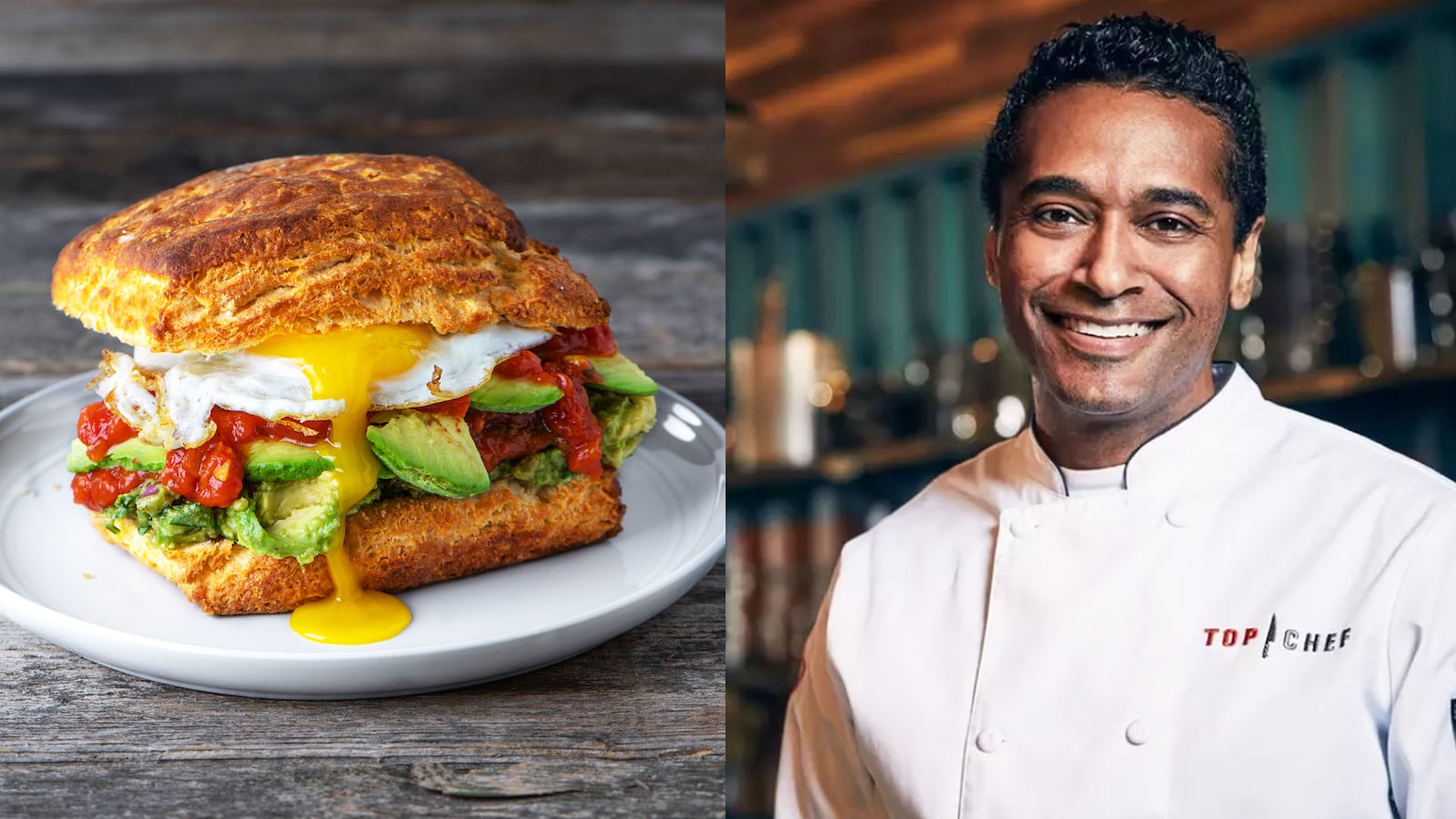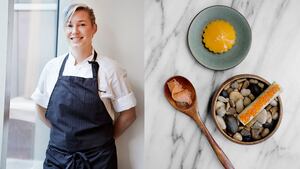Chris Scott grew up cooking in his family’s home in the middle of Pennsylvania’s Amish Country. The recipes he learned had been carried with his ancestors, who were enslaved people in the deep south and had migrated north after Emancipation, living for generations in Virginia.
He’s one of the most exciting new chefs on the culinary landscape. Scott’s famed restaurant Butterfunk Kitchen in Brooklyn earned him a spot on TV show Top Chef, where he was a semi-finalist. He has now morphed his original establishment into Butterfunk Biscuit Co., which he describes as a “quick service” restaurant in SoHo. It focuses on takeout and features biscuit sandwiches that reflect Harlem and African American food history. “And donuts,” he’s quick to remind me, lest I leave that out.
And, of course, he is working on a cookbook, about African American heritage cuisine, which is slated to come out next spring. I can tell from hearing him talk passionately about it that the book is going to have as much soul as soul food in it.
In this era of chefs talking about “projects” and “brands,” he is refreshingly more of a food philosopher speaking about the bonds between people eating together, and between people and their different heritages.
“Food and me are very spiritual. It’s about so much more than whipping something up and putting it on the plate, it’s about the connection. Cooking is where I lose myself, and where I find myself all over again,” he says. He tells me people ask him what his favorite tool is and that he always answers the kitchen table, “because that’s where we meet, where we can be restored, not just by food but by conversation, by love.”
Scott has cooked at nine James Beard Foundation dinners, including five times as the lead chef and in 2018 he created a special meal to celebrate Juneteenth with chefs Brother Luck, Tonya Hopkins and Adrienne Cheatham. This was the Beard House’s first Juneteenth dinner. Now it’s an annual event.

“A lot of people assume that soul food is all about fried chicken, ribs, watermelon, anything red velvet. True Southern food is all about the agriculture, because if you think about it, historic dishes were something that we grew,” he says. “A standard meal would be some type of vegetable stew, and if you were lucky you’d have a ham hock in there. If you’re true to what we ate back then, then everything that comes through that will be pure. People think of red velvet, but back then Black people were too poor to color something red just for the fun of it.”
Scott is also passionate about the current emergence of true African American food culture. “I’d like to see more of it make it to the global table, more Caribbean foods, more foods from Africa, the Middle East, to where we are an integral part of the global table.”
These are his five favorite meals.
One of the most exceptional meals I ever had was on the finale of Top Chef. Adrienne Cheatham made sea urchin on spoonbread with buttermilk dashi topped with a lobster crisp. I was always fascinated with Adrienne’s cooking style. We were competitors on the show, so I couldn’t really show my admiration for her cooking. I told her how beautiful the dish was and actually started to weep. She has a southern background just like I do, but the way she takes simple southern ingredients and elevates them to something beyond words is simply spectacular. Not only was I honored to be selected by her to help her win the show and become the first African American woman to win Top Chef, but I was glad to in that moment to enjoy a bite of food and have it tell me a story.
Omar Tate’s bean pie is out of this world. I’ve known about Omar for quite sometime as he worked his way through many kitchens, including the Cecil up in Harlem. Omar is far more than a chef. He is a poet, a thinker, a modern day griot telling the story of African American joy, pain, love, fear, and beauty and sometimes through his food. When we met for the very first time, we were both shopping for groceries in H Mart, and I knew right then and there that we had a connection. We’re both from Philadelphia, so we share that dynamic that goes way beyond the superficial cheesesteaks and soft pretzels. We share stories of police brutality during the Rizzo administration, the writings of Mumia and what summertime feels like down by the Plateau in Fairmount Park.
When we had the opportunity to cook together at an event in February, 2020, at the James Beard Foundation, I was super excited. Not only was I looking forward to his flavors, but I knew I would be intrigued with the stories that came with each dish—almost like a verbal “wine pairing.” His dessert course was a bean pie, yes, just like the ones sold by the Muslim brothers on the sidewalks. Omar is a Muslim and grew up in a Muslim household. His mother would make this bean pie all throughout his life, so I knew that when he was sharing this at the dinner, he was literally sharing a very intimate part of who he is. That’s what made it so special.
About eight years ago, for my birthday, and literally two weeks before the birth of our son, my wife took me to Sushi Yasuda. Now, I’ve had sushi before, but it was normally one of those trendy California roll spots or places that did origami out of nori sheets. This one was different; we actually got dressed up and we went early, so we sort of had the place to ourselves. There was minimal conversation with the chef, but one of the things that impressed me the most was the way he prepared these baby squids. I had never seen whole baby squids before, so already I was intrigued. The chef made a nage out of kombu and sake, and placed the squid in the broth. He then quickly chilled them and prepared them with something that was similar to yuzu and daikon. It was great to be submerged in a totally different food culture in its purest form, and to be sharing that moment with my wife and soon-to-be-born son.
My grandmother makes a simple dish that only requires three ingredients: potatoes, onions and bacon fat. No matter how hard I try, I cannot duplicate the flavors she creates in the pan. It’s simply fried potatoes. She’ll take a raw potato, slice it into rings, julienne an onion and cook everything in a skillet with the bacon fat. Some potatoes will be charred, some will be perfectly golden brown and some will simply be steamed from the condensation when she puts a lid on top. It’s probably one of my favorite things that she makes.
Growing up in Coatesville, Pennsylvania, we never had time for breakfast. My mother (a single mother) was usually up and out of the house by 5 AM. I would be second to leave by 7:45 AM and never really had time for a proper breakfast aside from a bowl of some sugary cereal. But on the weekends, that’s when the family came together and made something special or at least to us it was special. We would wake up to the aroma of these fried potatoes and onions, black coffee, eggs and toast.
Back in 2017, I had the opportunity to eat at a place called Comal, in Denver, Colorado. It’s a heritage food incubator and it employs individuals from Mexico, Syria, Iraq and other countries. On this day, I had the opportunity to cook with some women from Syria. They spoke of their journey to the United States and some of the loved ones they left behind in refugee camps. We spoke of and prepared typical Syrian dishes like mahshi and kibbeh, and how these foods made them happy. Having the opportunity to cook with complete strangers from another part of the world and celebrate our cultures is exactly why I do what I do. I always said that food is the “connective” that brings us together, and that moment in Denver, at Comal, proved that once again.
My Five Favorite Meals features the most cherished dining experiences of bartenders, chefs, distillers and celebrities.
Interview has been condensed and edited.








